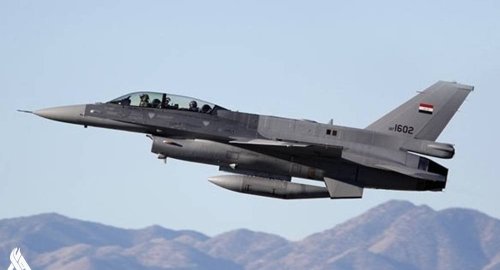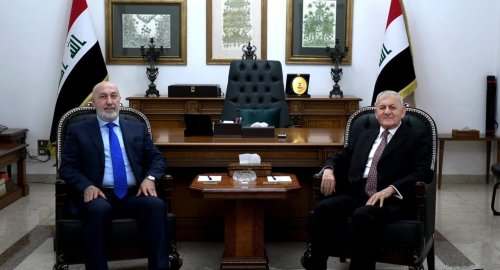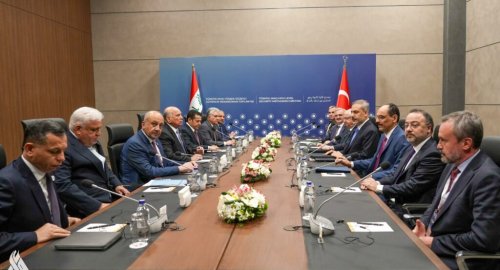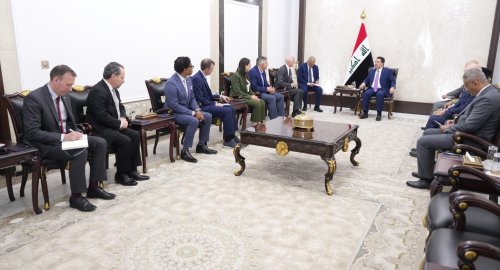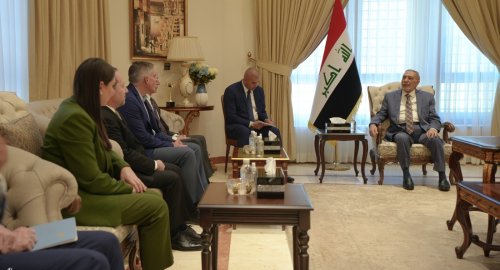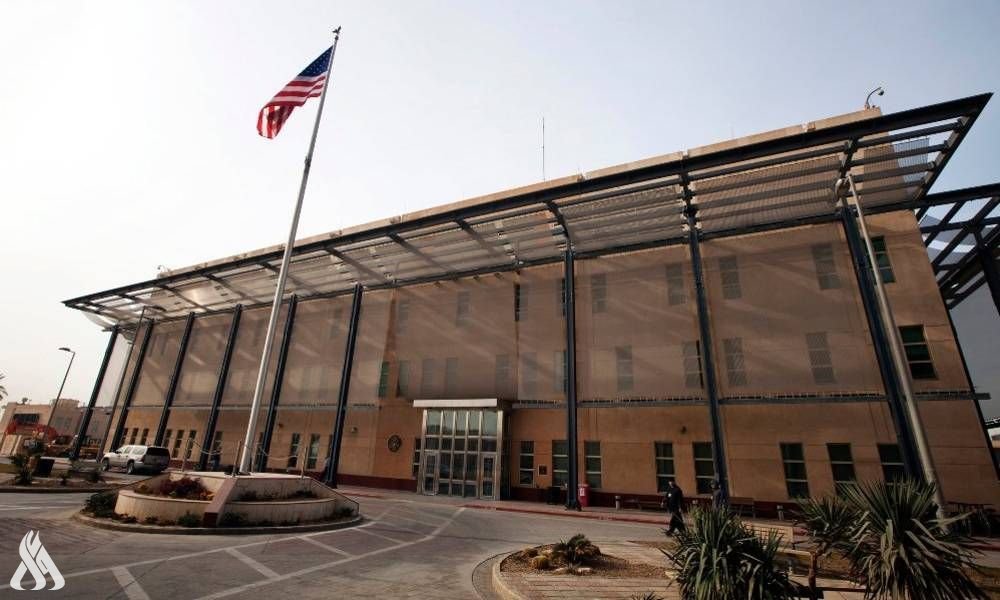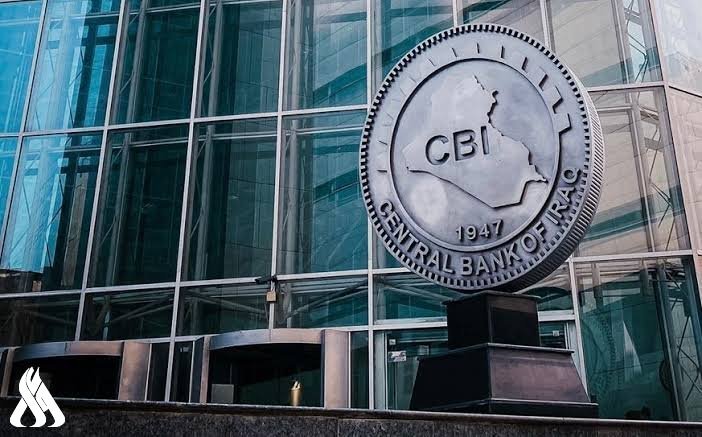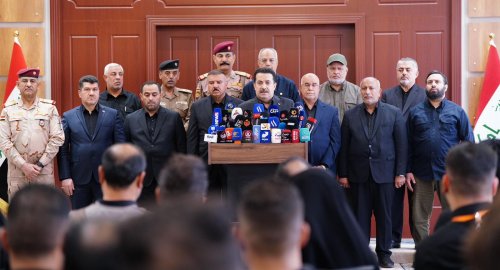
Prime Minister Mohammed S. Al-Sudani remarks during a joint press conference in Karbala alongside several ministers, Karbala Governor, and local security and service officials, at the conclusion of the Arbaeen Pilgrimage

- 6-09-2023, 20:50
Karbala-INA
God Almighty bestowed upon this earth the honor of this revolution and epic, allowing us to serve its rituals and pilgrims.
The government and its civil and security agencies dedicated themselves to providing comprehensive services during the pilgrimage, utilizing the state's resources to welcome millions of pilgrims.
I greatly appreciate the significant role undertaken by state institutions, beginning with the Higher Committee for the Arbaeen pilgrimage led by the Minister of Interior, and the dedication of the Permanent Committee for the Multi-Million Pilgrimages established earlier this year.
Expressing gratitude to the Council of Ministers, particularly the Ministers of Electricity and Health, along with the Deputy Ministers of Oil, Transport, Trade, and all governors across the nation.
We acknowledge the dedicated work of the governors of Basra, Maysan, Wasit, Diyala, and Babil—crucial junctions for multiple provinces—as well as the governors of Samarra and Salahuddin.
Appreciation to Karbala's Governor for their pivotal role in delivering services and projects that have streamlined pilgrim support.
Our upcoming destination will be the Najaf Governorate, where we will commemorate the anniversary of the passing of Prophet Muhammad (PBUH).
We applaud the security services for their comprehensive efforts, extending beyond security to encompass crucial service aspects.
We've been diligently tracking precise intelligence for 20 days, leaving no information from our intelligence services.
Gratitude to the Ministry of Defense's leaders, officers, and personnel, as well as the Joint Operation Command commanders, notably the Karbala Operations Commander and Police Commander. Thanks also to the Ministry of Interior units, the National Intelligence Service, National Security Service, and all other security services.
Appreciation for the heroic efforts of the Popular Mobilization Forces, who, through a coordinated plan, contributed significantly across multiple governorates, starting at the ports and concluding in Holy Karbala.
We commend the Hajj and Umrah Commission for their considerable involvement in transportation efforts for the first time.
We are currently evaluating a proposal to incorporate pilgrimage responsibilities into the mandate of the Hajj and Umrah Commission, creating an official administrative body in compliance with the law for this purpose.
Our deepest appreciation and gratitude go to the holy shrines authorities, including His Eminence Sheikh Abdul Mahdi al-Karbalai, the dedicated teams at the Husseini Shrine, His Eminence Mr. Ahmed al-Safi and the Abbasi Shrine authority, the Imam Ali Shrine authority, along with the Kadhimiya Shrine and Samara Shrine, for their exceptional efforts.
The exceptional level of service during this pilgrimage, exceeding all standards, owes much to the tireless efforts of the popular Husseini processions organizers, complementing the official state agencies.
During the pilgrimage, the Husseini procession organizers accompany pilgrims across every governorate and city for over 20 days, leading them to the holy city of Karbala.
These processions were inclusive, encompassing all Iraqis regardless of sect, religion, or province.
The involvement of Yazidis, Christians, and Sabians exemplified the national diversity that we hold dear.
This marks the inaugural pilgrimage where security service members, both in Anbar Governorate and other regions, are actively involved in safeguarding the pilgrimage paths.
All governorates, including Nineveh, Salahuddin, Anbar, and Diyala, as well as the Kurdistan Region of Iraq, contributed resources, including transportation vehicles and support teams, to this effort.
Initial expectations and indicators foresaw an unprecedented turnout for this year's pilgrimage, and that indeed materialized. Hence, preparations began early, with the formation of specialized committees.
A unified team spirit prevailed, with immediate responses and meticulous daily follow-ups, from the ports and provinces to the holy city of Karbala, addressing even the smallest of details.
A large number of volunteers participated in providing service, with the security forces, security agencies and the governorate departments.
The Cabinet dedicated 50 billion dinars to governorates, shrine authorities, and ministries to bolster this pilgrimage, supplemented by an extra 6 billion dinars from emergency budget allocations to enhance supplementary services.
In a first-time initiative, modern buses, with a cap of 1,200, were rented from companies specializing in Umrah and pilgrimage services.
We successfully executed the Baghdad Road project, Jurf Al-Nasr, and Al-Fadhiliyah Bridge, racing against time with the skill, competence, and dedication of Iraqi engineers.
Although the technical estimate projected a six-month completion timeline, the project was accomplished in just two months through the joint efforts of Babil, Baghdad, and Karbala governorates, overseen by the Ministry of Housing and Construction, with valuable contributions from security forces.
This project serves as a crucial route to facilitate the entry and exit of pilgrims to and from Karbala.
Throughout this period, the Council of Ministers has issued a total of eight decisions and directives, instrumental in overcoming obstacles and enhancing service provision.
In February of last year, we established the Higher Permanent Committee for Multi-million Pilgrimage. We've been assessing various proposals for enhancing infrastructure, such as bridges, overpasses, roads, and border crossings, to streamline pilgrim movement across governorates.
The security plan remains active, overseeing the safe return of the large number of pilgrims from Karbala to their provinces.
A comprehensive conference will convene, gathering all participating agencies in the pilgrimage, to present their reports, analyze findings, and integrate proposals in preparation for next year's plan.
Several upcoming projects have been identified, including the drinking water project connecting Karbala and Najaf, alternate roadways, bridge constructions, and various other developments.
Gratitude to all local and international media outlets that covered the pilgrimage, capturing the significance of this event and the dedicated efforts made along the way.
We've emphasized the importance of proceeding with the Karbala-Najaf railway project, which significantly impacts the daily commute for our citizens to the holy shrines.
I extend my heartfelt gratitude to the people of Karbala, who have exhibited remarkable religious, social, and cultural contributions during these past days, through both their Hussaini processions and various initiatives.
US Embassy: Trade Mission of 60 Companies Visits Iraq
- politics
- 25/04/07
CBI unveils comprehensive reform plan to modernize banking sector
- Economy
- 25/04/07
Al-Sudani Meets Delegation from J.P. Morgan Bank
- politics
- 25/04/08



